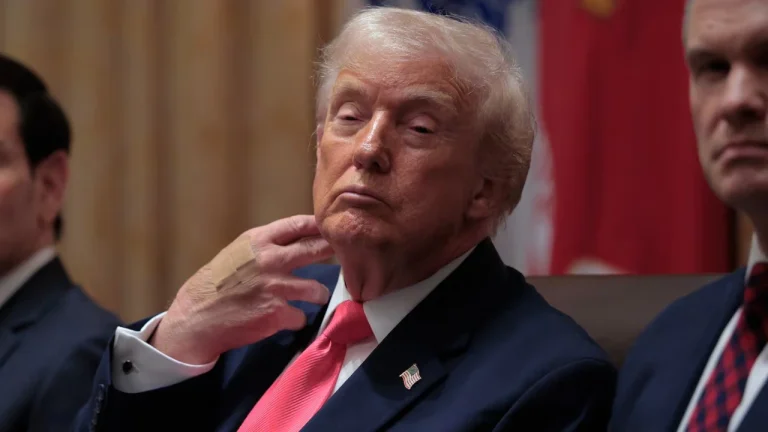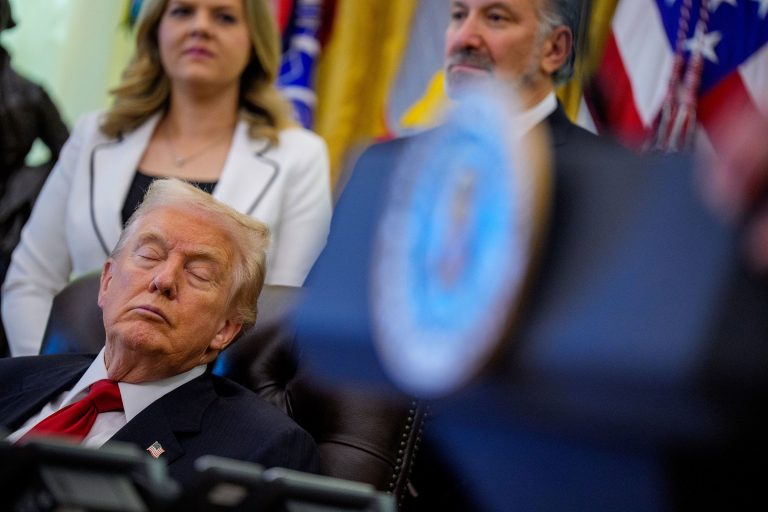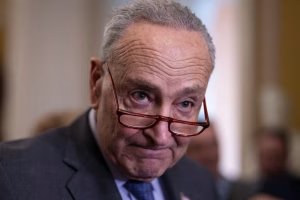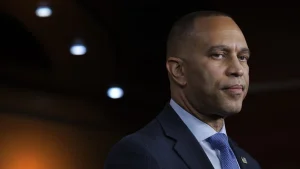Schumer Faces Growing Backlash After Shutdown Deal
Senate Minority Leader Chuck Schumer is under heavy fire from within his own party following Sunday’s dramatic Senate vote that advanced a bipartisan deal to reopen the government after 40 days of closure — the longest shutdown in U.S. history.
Eight members of the Senate Democratic Caucus, including one independent, broke ranks with Schumer and voted alongside Republicans to move the legislation forward. The move ended weeks of gridlock but sparked immediate outrage among progressives, who accused Schumer of losing control of his caucus and surrendering key policy goals.
The Longest Shutdown in History
The shutdown stretched on for nearly six weeks, affecting millions of Americans. Federal agencies slowed or stopped operations, airports reported canceled flights and staffing shortages, and assistance programs across 25 states warned of “catastrophic disruptions.”
With tensions mounting nationwide, Sunday’s vote was seen as a necessary step toward restoring basic government functions. But inside the Democratic Party, it also exposed deep rifts over strategy, leadership, and priorities heading into a crucial election year.
Why Democrats Are Angry
At the core of the dispute was the issue of healthcare. Democrats had demanded that any reopening deal include an extension of Affordable Care Act (ACA) tax credits, which help millions of Americans afford insurance and are set to expire at the start of next year.
The final agreement failed to include that provision. Instead, Republicans offered only a promise to schedule a future vote on the subsidies before mid-December — a pledge many Democrats saw as hollow.
To progressives, that outcome represented a surrender on one of their most important economic and social priorities.
Internal Division Boils Over
Schumer’s inability to keep his caucus unified has reignited a long-standing debate over his leadership. Critics say he has repeatedly misread the mood of his members and failed to stand firm against Republican pressure.
California Governor Gavin Newsom, a prominent Democrat often mentioned as a potential 2028 presidential contender, didn’t mention Schumer by name but delivered a thinly veiled rebuke.
“The American people need more from their leaders,” Newsom said on X. “Tonight’s Senate vote on the federal government shutdown should have been a time for strength. Instead, we saw capitulation and a betrayal of working Americans.”
Calls for Schumer to Step Down
Several House Democrats went further, openly calling for Schumer to be replaced. Representative Ro Khanna of California was among the most direct.
“Senator Schumer is no longer effective and should be replaced,” Khanna wrote. “If you can’t lead the fight to stop health care premiums from skyrocketing for Americans, what will you fight for?”
Representative Alexandria Ocasio-Cortez echoed the frustration.
“People want us to hold the line for a reason,” she posted. “This is not about appealing to a base. It’s about people’s lives. Working people want leaders whose word means something.”
Massachusetts Representative Seth Moulton added his voice, arguing that the vote underscored the need for generational change in Democratic leadership.
“Tonight is another example of why we need new leadership,” Moulton said. “If Chuck Schumer were an effective leader, he would have united his caucus to vote ‘No’ and hold the line on healthcare.”
Observers Question Schumer’s Strategy
Outside Washington, analysts and journalists criticized Schumer’s handling of the negotiations.
Adam Cochran, a policy consultant and independent journalist, accused Schumer of trying to distance himself from the backlash while allowing others to take the political risk.
“Schumer organized this, then voted no at the last second, letting retiring Democrats take the heat,” Cochran wrote. “If this goes through, that needs to be the end of Schumer’s leadership. The buck stops with him.”
Ron Filipkowski, editor-in-chief of the liberal outlet MeidasTouch, expressed similar frustration.
“Please don’t think this game of having retiring Democrats vote yes while everyone else votes no is going to shield leadership from the result,” he said. “We see what’s happening and can’t be fooled.”
Political Fallout Across the Party
The reaction underscores how fragile Democratic unity has become as the 2026 midterm elections approach. The party has been split between those urging compromise to keep the government running and those demanding a stronger stance on healthcare and economic justice.
James D. Boys, a senior research fellow at the University College London’s Center on U.S. Politics, summarized the situation bluntly.
“Earlier in the year, Schumer caved to Trump and was derided by the left of his party,” he wrote. “Tonight, he’s been defied by a core group of his caucus after the longest shutdown in U.S. history — and is once again derided by the left. Different tactics, same result.”
Progressives Warn of Larger Consequences
Senator Bernie Sanders, one of the Senate’s most outspoken progressives, warned that giving in now could have long-term consequences beyond healthcare.
“It would be a horrific mistake for Democrats to give up now without an Obamacare deal,” Sanders said. “If Democrats cave on this issue, what it will say to Donald Trump is that he has a green light to go forward toward authoritarianism. And I think that would be a tragedy for this country.”
Sanders’ warning reflects broader concerns among progressives that repeated compromises on core policies could demoralize voters and weaken the party’s message ahead of 2026.
The Leadership Question
While there have been periodic calls for new leadership before, this moment appears more volatile. Schumer faces growing skepticism not only from progressives but also from moderates who fear his strategy is alienating both sides.
Some Democratic aides have suggested that internal discussions about leadership succession may intensify in the coming months. Though no formal challenge is on the horizon, insiders note that the tone has shifted from quiet frustration to open rebellion.
A Deal with Limited Rewards
The agreement Schumer’s caucus helped pass will reopen the government temporarily, funding agencies until January 30, 2026. It guarantees back pay for federal workers and reverses several furlough-related dismissals but does not address long-term funding issues.
Republicans, led by Senate Majority Leader John Thune, praised the vote as a responsible step forward and said they would hold a vote on the ACA subsidies later this year. But critics doubt the GOP has any intention of approving an extension.
An Uncertain Path Forward
Even as operations resume, the political damage may linger. Democrats are struggling to explain to voters why they prolonged the shutdown for six weeks only to end it without securing major policy wins.
“Schumer wanted to project strength, but the result looks like confusion,” said one Democratic strategist. “He’s lost leverage with both the White House and the base.”
For now, the immediate crisis may be ending — but the aftershocks inside the Democratic Party are just beginning. The vote has reopened an old debate about who should lead the party through the turbulent years ahead.
As one Capitol Hill staffer put it Sunday night:
“We reopened the government, but we might have opened something else, too — a leadership crisis.”

Sarah Mitchell is a bestselling novelist recognized for her insightful and emotionally resonant stories that explore the complexities of human relationships. Originally from Denver, Colorado, Sarah grew up in a family of teachers who nurtured her curiosity and love for storytelling. She studied psychology at Stanford University, where she became fascinated by the intricacies of human behavior—an interest that would later shape her writing career. Sarah’s novels are praised for their nuanced characters, intricate plots, and ability to capture the subtle tensions that define love, friendship, and family ties. Her breakthrough novel, The Spaces Between Us, became an instant bestseller, lauded for its honest portrayal of strained family relationships and the fragile bonds that hold people together. Since then, she has published several works that continue to captivate audiences around the world. Outside of her writing career, Sarah is passionate about mental health advocacy and often partners with organizations to promote awareness and support for those struggling with emotional well-being. Her personal life is quieter—she enjoys hiking in the Colorado mountains, practicing yoga, and spending time with close friends. With each new book, Sarah Mitchell cements her reputation as a writer who illuminates the beauty and struggles of human connection.









